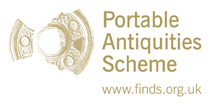File:Early Medieval Supporting Arm Brooch (FindID 155128).jpg
Appearance

Size of this preview: 800 × 416 pixels. Other resolutions: 320 × 166 pixels | 640 × 333 pixels | 1,024 × 532 pixels | 1,280 × 665 pixels | 2,560 × 1,331 pixels | 4,147 × 2,156 pixels.
Original file (4,147 × 2,156 pixels, file size: 671 KB, MIME type: image/jpeg)
File history
Click on a date/time to view the file as it appeared at that time.
| Date/Time | Thumbnail | Dimensions | User | Comment | |
|---|---|---|---|---|---|
| current | 15:04, 6 February 2017 |  | 4,147 × 2,156 (671 KB) | Fæ | Portable Antiquities Scheme, ESS, FindID: 155128, early medieval, page 6319, batch sort-updated count 74026 |
File usage
The following page uses this file:

